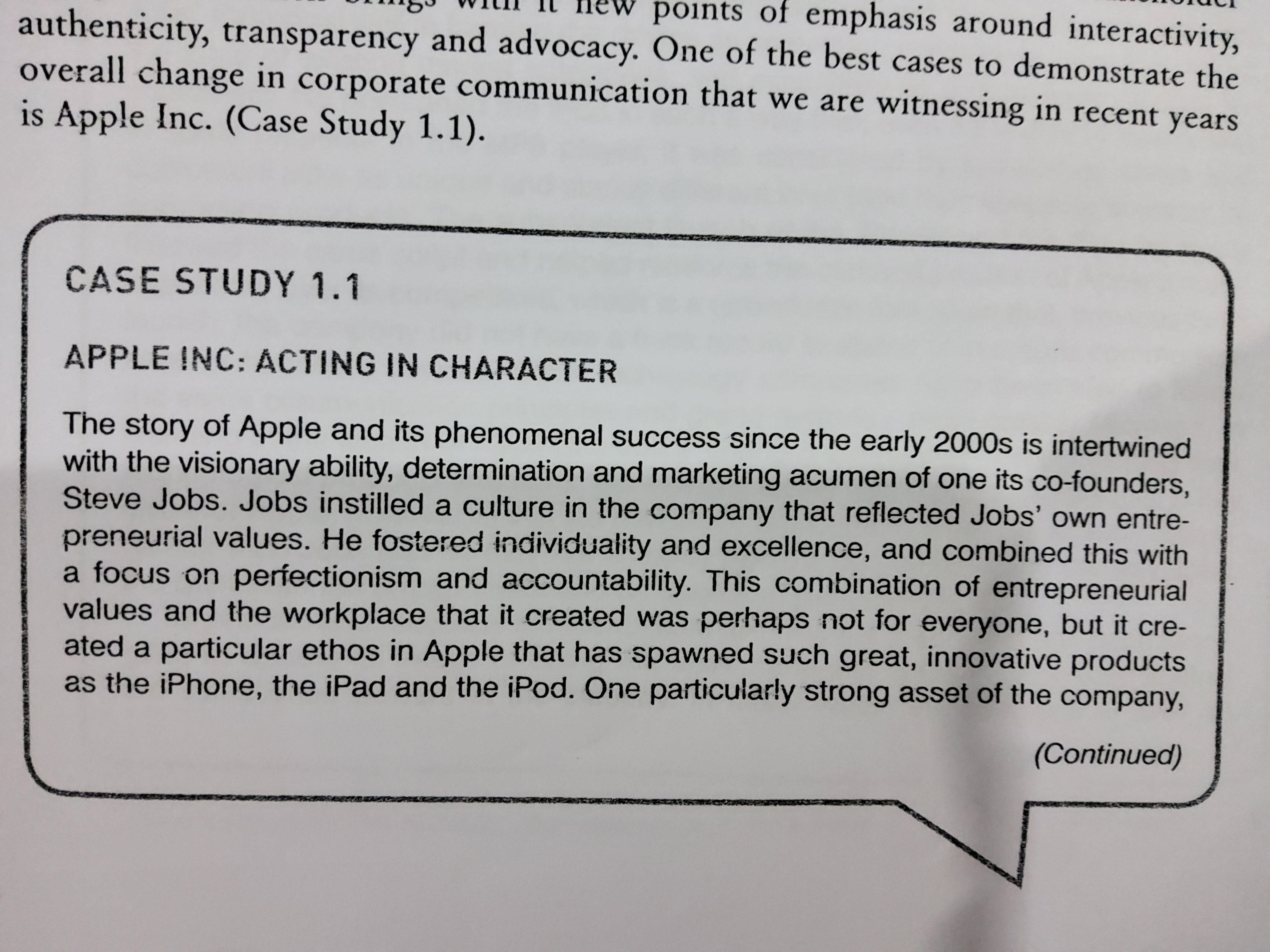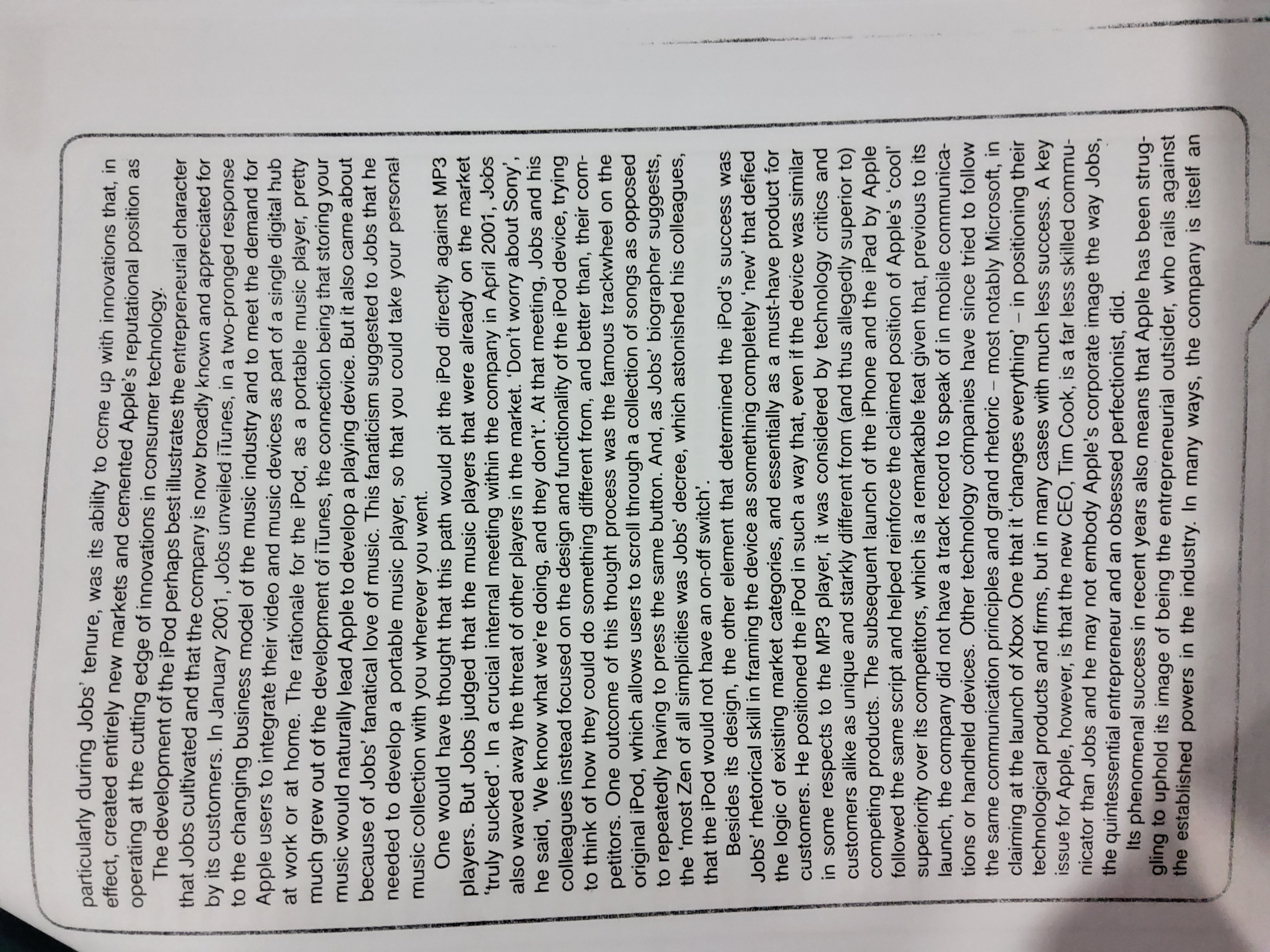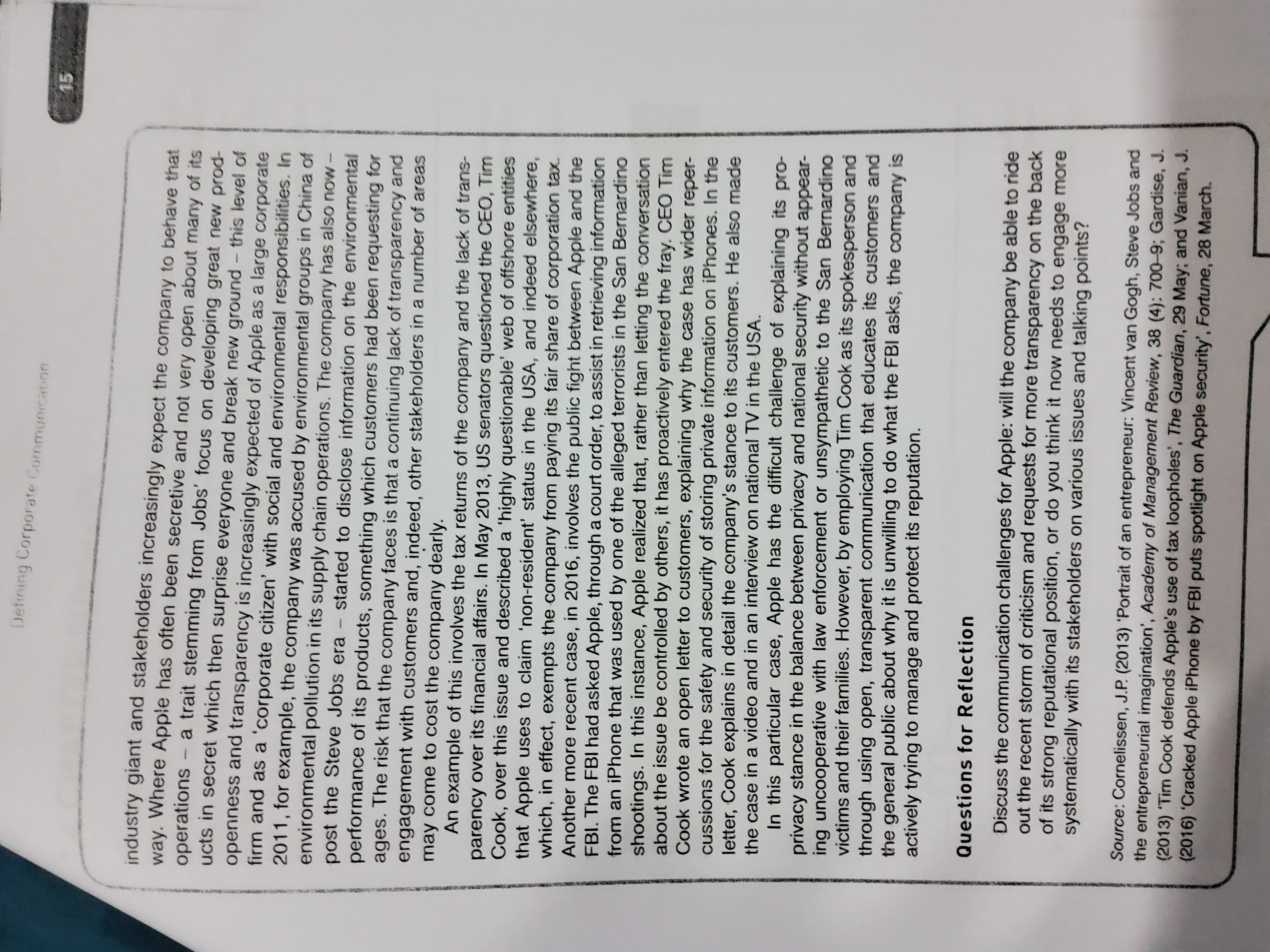Answered step by step
Verified Expert Solution
Question
1 Approved Answer
authenticity, transparency and advocacy. One of the best cases to demonstrate the points of emphasis around interactivity, overall change in corporate communication that we



authenticity, transparency and advocacy. One of the best cases to demonstrate the points of emphasis around interactivity, overall change in corporate communication that we are witnessing in recent years is Apple Inc. (Case Study 1.1). CASE STUDY 1.1 APPLE INC: ACTING IN CHARACTER The story of Apple and its phenomenal success since the early 2000s is intertwined with the visionary ability, determination and marketing acumen of one its co-founders, Steve Jobs. Jobs instilled a culture in the company that reflected Jobs' own entre- preneurial values. He fostered individuality and excellence, and combined this with a focus on perfectionism and accountability. This combination of entrepreneurial values and the workplace that it created was perhaps not for everyone, but it cre- ated a particular ethos in Apple that has spawned such great, innovative products as the iPhone, the iPad and the iPod. One particularly strong asset of the company, (Continued) particularly during Jobs' tenure, was its ability to come up with innovations that, in effect, created entirely new markets and cemented Apple's reputational position as operating at the cutting edge of innovations in consumer technology. The development of the iPod perhaps best illustrates the entrepreneurial character that Jobs cultivated and that the company is now broadly known and appreciated for by its customers. In January 2001, Jobs unveiled iTunes, in a two-pronged response to the changing business model of the music industry and to meet the demand for Apple users to integrate their video and music devices as part of a single digital hub at work or at home. The rationale for the iPod, as a portable music player, pretty much grew out of the development of iTunes, the connection being that storing your music would naturally lead Apple to develop a playing device. But it also came about because of Jobs' fanatical love of music. This fanaticism suggested to Jobs that he needed to develop a portable music player, so that you could take your personal music collection with you wherever you went. One would have thought that this path would pit the iPod directly against MP3 players. But Jobs judged that the music players that were already on the market 'truly sucked'. In a crucial internal meeting within the company in April 2001, Jobs also waved away the threat of other players in the market. 'Don't worry about Sony', he said, 'We know what we're doing, and they don't'. At that meeting, Jobs and his colleagues instead focused on the design and functionality of the iPod device, trying to think of how they could do something different from, and better than, their com- petitors. One outcome of this thought process was the famous trackwheel on the original iPod, which allows users to scroll through a collection of songs as opposed to repeatedly having to press the same button. And, as Jobs' biographer suggests, the 'most Zen of all simplicities was Jobs' decree, which astonished his colleagues, that the iPod would not have an on-off switch'. Besides its design, the other element that determined the iPod's success was Jobs' rhetorical skill in framing the device as something completely 'new' that defied the logic of existing market categories, and essentially as a must-have product for customers. He positioned the iPod in such a way that, even if the device was similar in some respects to the MP3 player, it was considered by technology critics and customers alike as unique and starkly different from (and thus allegedly superior to) competing products. The subsequent launch of the iPhone and the iPad by Apple followed the same script and helped reinforce the claimed position of Apple's 'cool' superiority over its competitors, which is a remarkable feat given that, previous to its launch, the company did not have a track record to speak of in mobile communica- tions or handheld devices. Other technology companies have since tried to follow the same communication principles and grand rhetoric - most notably Microsoft, in claiming at the launch of Xbox One that it 'changes everything' - in positioning their technological products and firms, but in many cases with much less success. A key issue for Apple, however, is that the new CEO, Tim Cook, is a far less skilled commu- nicator than Jobs and he may not embody Apple's corporate image the way Jobs, the quintessential entrepreneur and an obsessed perfectionist, did. Its phenomenal success in recent years also means that Apple has been strug- gling to uphold its image of being the entrepreneurial outsider, who rails against the established powers in the industry. In many ways, the company is itself an Defining Corporate Communication - operations industry giant and stakeholders increasingly expect the company to behave that way. Where Apple has often been secretive and not very open about many of its a trait stemming from Jobs' focus on developing great new prod- ucts in secret which then surprise everyone and break new ground - this level of openness and transparency is increasingly expected of Apple as a large corporate firm and as a 'corporate citizen' with social and environmental responsibilities. In 2011, for example, the company was accused by environmental groups in China of post the Steve Jobs era environmental pollution in its supply chain operations. The company has also now- started to disclose information on the environmental performance of its products, something which customers had been requesting for ages. The risk that the company faces is that a continuing lack of transparency and engagement with customers and, indeed, other stakeholders in a number of areas may come to cost the company dearly. - An example of this involves the tax returns of the company and the lack of trans- parency over its financial affairs. In May 2013, US senators questioned the CEO, Tim Cook, over this issue and described a 'highly questionable' web of offshore entities that Apple uses to claim 'non-resident' status in the USA, and indeed elsewhere, which, in effect, exempts the company from paying its fair share of corporation tax. Another more recent case, in 2016, involves the public fight between Apple and the FBI. The FBI had asked Apple, through a court order, to assist in retrieving information from an iPhone that was used by one of the alleged terrorists in the San Bernardino shootings. In this instance, Apple realized that, rather than letting the conversation about the issue be controlled by others, it has proactively entered the fray. CEO Tim Cook wrote an open letter to customers, explaining why the case has wider reper- cussions for the safety and security of storing private information on iPhones. In the letter, Cook explains in detail the company's stance to its customers. He also made the case in a video and in an interview on national TV in the USA. In this particular case, Apple has the difficult challenge of explaining its pro- privacy stance in the balance between privacy and national security without appear- ing uncooperative with law enforcement or unsympathetic to the San Bernardino victims and their families. However, by employing Tim Cook as its spokesperson and through using open, transparent communication that educates its customers and the general public about why it is unwilling to do what the FBI asks, the company is actively trying to manage and protect its reputation. Questions for Reflection Discuss the communication challenges for Apple: will the company be able to ride out the recent storm of criticism and requests for more transparency on the back of its strong reputational position, or do you think it now needs to engage more systematically with its stakeholders on various issues and talking points? Source: Cornelissen, J.P. (2013) 'Portrait of an entrepreneur: Vincent van Gogh, Steve Jobs and the entrepreneurial imagination', Academy of Management Review, 38 (4): 700-9; Gardise, J. (2013) 'Tim Cook defends Apple's use of tax loopholes', The Guardian, 29 May; and Vanian, J. (2016) 'Cracked Apple iPhone by FBI puts spotlight on Apple security', Fortune, 28 March. 15
Step by Step Solution
There are 3 Steps involved in it
Step: 1

Get Instant Access to Expert-Tailored Solutions
See step-by-step solutions with expert insights and AI powered tools for academic success
Step: 2

Step: 3

Ace Your Homework with AI
Get the answers you need in no time with our AI-driven, step-by-step assistance
Get Started


